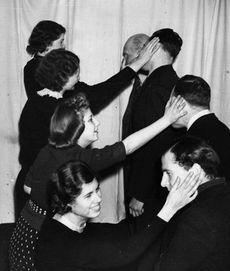Slapdash
The honourable game of slapdash has been played in secondary schools across the world for many a decade, and is now infiltrating down to primary and even nursery level. It is a very simple game at heart, as it only has two objectives — one player, known as the aggressor, must slap the other, called the victim, and then run as fast as they can to win a point and avoid potential injury, death, or sandwich filling. Traditionally, the first player to four points is the winner, though in some countries a last man standing policy has been adopted whereby the first victim to kill their aggressor wins the match, as well as a complimentary twenty year jaunt to the ultra-clean land of metal and soap.
Gameplay[edit | edit source]
The game was named slapdash due to the two main parts of the game, the aggressor "slapping" the victim and then "dashing" for his life. This is the basic approach to the game, and mastering these two key elements will make a great slapdashite out of a player. However, many advanced techniques have been invented in order to take gameplay to the next level
There are many different versions of these strategies that make winning games of slapdash much easier. Of course, most teenagers haven't the brain cells to comprehend the word strategy, let alone use one, but the ones that do have a huge inherent advantage. There is the pinch-hitter strategy, whereby the aggressor hits the victim as lightly as possible in order to get away quicker (and possibly to anger the victim less, leading to an easier getaway). Another strategy is the tank strategy, where you try and hit the victim as hard as possible in order to injure, kill, or wedgie them. This is the strategy favoured by the brutes of the playground, as it coincides with their daily routines, as well as their caveman-esque heads.
History[edit | edit source]
A rudimentary, more violent form of slapdash, known as "tag", has been played in school playgrounds since the sixteenth century. However, as ceaseless bureaucracy swept the lands in the 1900s, it was thought to be imperative to streamline the game, and make sure there was a clear winner. The little kids, however, did not want to lose their precious game of tag; in 1931, a truce was agreed, and thus slapdash was created to take the role of the bureaucratic children's game.
However, it did not become accepted as a game worth of playground hijinks for a long time. Parents, worried about their social status, and children, – shockingly – worried about their parent's social status (the first time in recorded history that a child has ever given a crap about a parent), both rejected the idea of a game that could affect those not playing it. As time wore on, and countries degenerated into glorified Arena Fighting matches, it was played more and more, until it finally became the second most played game in schools (behind Shotgun).
This popularity finally came to a head in 1993, when a record 4,823,044 people played the game daily. This overwhelmed hospitals both nationally and internationally, resulting in the bed shortages still commonly seen today. It has often been said that, in a choice between a dying baby and someone who needed treatment for a slapdash attack, those madmen in white coats will take the gamer in all cases except heat death.
There have been attempts by some British schools to introduce a spin-off game, happyslapdash, where the aggressor has a team-mate recording the initial slap, with points awarded for correct camera placement and stylistic approach work. Unfortunately, since British teenagers do not know the definition of style, no extra points were awarded, and thus happyslapdash died out quickly.
Slapdash today[edit | edit source]

Slapdash is still intensely popular today, especially among high school students, who see it as a way of expending energy without the threat of death, arrest or any kind of effort whatsoever. It also piqués the curiosity of those who like a fair fight, as, due to the nature of the opening stages of the game, it often devolves into all out warfare, complete with mass prodding and the odd nuke.
Part of its unique appeal is the game's innate ability to exact revenge on people it doesn't like. For example, say a "cool" (read insanely nerdy) player decides to show off to his colleagues on the first turn. Unlike in most games, where they would get away and possibly get adulation for this most corny of crimes, in slapdash there is usually a tendency for these people to get a comeuppance in a humorous, slapstick, often vampiric manner (one of the most popular chasing techniques, the "throb'n'suck", was based on this fact).
Competitions[edit | edit source]
There have, given the mass bureaucratic background of the game, been many official slapdash tournaments, ranging from inter-school competitions to the O'Slapsticks, an event for amateur slapdashers worldwide. There have been many reports of underhand deals at these events, but these are shrugged off monthly by the OOSS (Official Organisation of the Suits of Slapdash, natively Organisation Officielle des Costumès du Tiretclaque) as frivolous, mainly due to the fact that "the teenagers who star at slapdash will not, under any circumstances, take an offer of money while there is the opportunity of ice-cream to be won". Ice-cream, incidentally, is the main prize for winning an O'Slapstick event, in no small part due to Walls' 150-year sponsorship of the event, worth approximately £8/year, more than enough to fund the rundown field on which the event is based.
